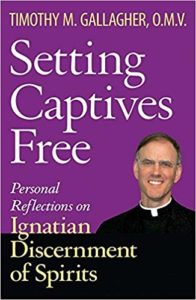Podcast: Play in new window | Download (Duration: 36:34 — 25.1MB) | Embed
Subscribe: Apple Podcasts | Spotify | Amazon Music | Android | Pandora | iHeartRadio | JioSaavn | Podchaser | Gaana | Podcast Index | Email | TuneIn | Deezer | Anghami | RSS | More
Journey Through Desolation – Spiritual Desolation: Be Aware, Understand, Take Action with Fr. Timothy Gallagher
Fr. Timothy Gallagher and Kris McGregor discuss spiritual desolation in the context of Ignatian spirituality, focusing on three important actions: Being aware, understanding, and taking action. They highlight the confusion between desolation and depression, emphasizing the need for clarity.
Fr. Gallagher shares insights from St. Ignatius’ conversion experience, highlighting his awareness, understanding, and how he took action during that time. Fr. Gallagher also explores practical steps to reject desolation and move towards the goal of spiritual consolation. The saints’ relatable struggles underscore the universal nature of the spiritual journey, providing hope and guidance for discernment.
From the Prologue of Setting the Captives Free: Personal Reflections on Ignatian Discernment of Spirits:
“Five hundred years ago, Ignatius entered the realm of the heart and crafted a set of guidelines for responding to interior experience, both joyful (spiritual consolation) and discouraging (spiritual desolation), on the spiritual level. These guidelines, when well explained, equip hearers to be aware of, understand the significance of, and take action in response to their spiritual experience. Said differently, they take Christian anthropology—the fact that only in Christ can the human person be understood fully—seriously, and render it operative. When one applies these guidelines, the full Christian understanding of the human person ceases to remain a theological construct and is rendered concretely applicable in daily living. For over three decades, I have seen many apply these guidelines with much fruit.“

Discerning Hearts Reflection Questions:
- How do you distinguish between spiritual desolation and depression in your own life, and why is this distinction important in the context of Ignatian spirituality?
- Reflect on a moment in your life when you experienced spiritual consolation. How did that experience impact your relationship with God and your spiritual journey?
- In your understanding, how does the concept of being aware, understanding, and taking action apply to discernment in the spiritual life? Share a personal example if possible.
- Consider the role of hope in facing spiritual desolation. How can the teachings of Ignatius and the experiences of saints inspire hope in times of discouragement?
- How has the universal nature of the spiritual struggle, as discussed in the podcast, resonated with your own experiences? In what ways does knowing that saints faced similar challenges provide encouragement for your spiritual journey?
- Discuss the importance of sharing personal stories and experiences in the context of Catholic spirituality. How can your own journey serve as a mirror for others, fostering a sense of community and mutual understanding in faith?
For the other episodes in this series check out Fr. Timothy Gallagher’s “Discerning Hearts” page
Father Timothy M. Gallagher, O.M.V., was ordained in 1979 as a member of the Oblates of the Virgin Mary, a religious community dedicated to retreats and spiritual formation according to the Spiritual Exercises of St. Ignatius. Fr. Gallagher is featured on the EWTN series “Living the Discerning Life: The Spiritual Teachings of St. Ignatius of Loyola”.
For more information on how to obtain copies of Fr. Gallaghers’s various books and audio which are available for purchase, please visit his website: frtimothygallagher.org

 In part one of this conversation, Fr. Timothy Gallagher and Kris McGregor engage in a profound discussion on the nature of prayer, particularly in the context of suffering and spiritual desolation. They both point out the importance of prayer as more than just verbal communication with God, making note of its holistic nature, which involves the entire being united in love and longing for God.
In part one of this conversation, Fr. Timothy Gallagher and Kris McGregor engage in a profound discussion on the nature of prayer, particularly in the context of suffering and spiritual desolation. They both point out the importance of prayer as more than just verbal communication with God, making note of its holistic nature, which involves the entire being united in love and longing for God.